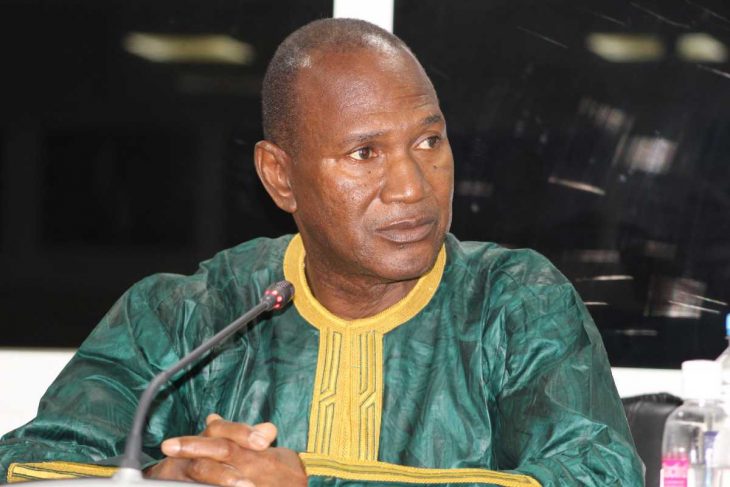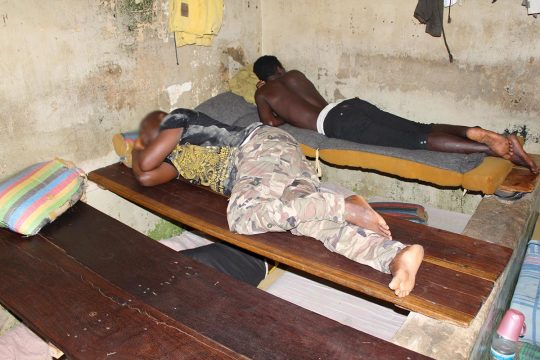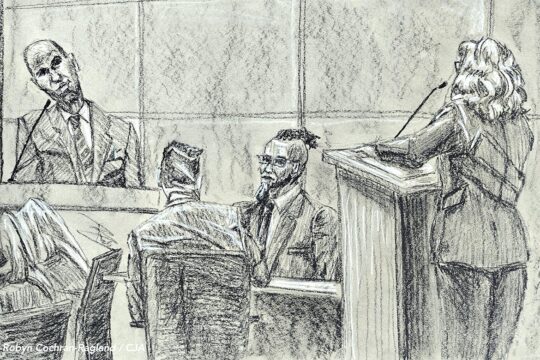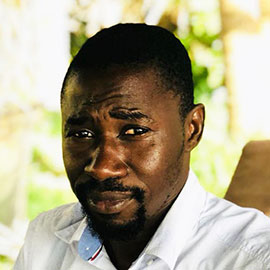David Colley is a familiar name in The Gambia. He was the longest serving director-general of former president Yahya Jammeh’s “five star hotel”, a euphemism for Mile 2, a notorious prison built by the British in 1920 in a mosquito-infested, swampy area in the outskirt of Banjul, Gambia’s capital city.
Colley has worked over 30 years in the country’s prison system, including 13 years as director general. As a result, his name was the most mentioned before the Truth, Reconciliation and Reparations Commission (TRRC) in its investigation on rights violations at Mile 2 prison. Early July he was the 22nd witness to testify on the conditions of prisons under Jammeh from 1994 to 2016. He spent three days answering questions on death, torture, illegal detention, poor food and poor medical facility suffered by prisoners.
Prior to his appearance, four weeks of related evidence was heard by the TRRC. Despite poor record keeping, the Commission could establish that at least 41 people have died at Mile 2 from 1994 to 2017. At least two, Ebrima Joof and Lamarana Jallow, died as a result of torture, according to testimonies, while the main causes of death are the result of poor diet. In January 2006 five inmates died after reportedly consuming bad food. This coincided with a time when Colley was alleged to have fed prisoners with the carcass of a bull, an allegation Colley denied.
“The allegation is that during your time you presided over a prison system that was not fit for purpose. In fact, I have the statement of Amadou Scattred Janneh ( a political activist now member of the major opposition party) who described the prison as the worst prison in the world,” stated Essa Faal, the TRRC lead counsel, as Colley began his testimony.
“I was not there”
Colley, 62, appeared lacking intelligence and education. “Prison administration was left in the hands of people who do not know what they were doing,” said Faal in front of the witness who specified he had “graduated at grade 9”.
Colley was inconsistent on how much control he, the National Intelligence Agency (NIA) or the Junglers, a splinter group recruited from the army and reporting directly to Jammeh, exercised over the prisons. He said he was in charge while admitting that the security wing of Mile 2, a section where tough or so-called high-profile prisoners are kept, was controlled by military personnel like the Junglers and the NIA. “They would bring [the prisoners] usually at night when I would be at home,” argued Colley. “I do not have control over [the Junglers and NIA].” However, he admitted opening the prison to the NIA and to Junglers for the illegal detention and torture of detainees who were brought without proper paper work.
Colley testified that he once brought the illegal detentions to the attention of Interior minister Ousman Sonko. “He [Sonko] would tell me to just accept it. It was not the normal procedure but what do you expect I could do?” (Sonko has been in pre-trial detention in Switzerland since 2017.)
“The fact of the matter is that you have given these security officers carte blanche to come inside the prisons and do whatever they wanted and take away whomever they wanted. That is what used to happen,” Faal put to Colley.
“Of course,” admitted Colley.
“It was against the law.”
“Someone who comes and approaches you with a gun, and even me, I am not armed, what will I do?”
“Who threatened you with a gun? The NIA or the Junglers?”
“I was not there. They usually do not come during day time. So, my officers would be there.”
“Have you ever done anything about their illegal entering into the prison?”
“I have never thought of that or I would lose my life.”
“And the reason why you did not want to do anything was because you were afraid”
“Yes, I don’t want to lose my life.”

The murder of Baba Jobe
Jammeh’s 22-year rule sometimes looked like Game of Thrones: a tale of betrayal, treachery and death where former friends fall on the dictator’s sharp sword. In January 2017 when Jammeh lost power, none of the people who had played a major part in their 22 July 1994 military coup was in his cabinet.
On top of that long list of old fallen friends is Baba Jobe. Jobe, nicknamed “money shop”, was trained in Libya and drunken with Gaddafi’s revolutionary ideas. He came to be one of the leading players in the early designs of what Jammeh referred to as the “July 22 revolution”. Baba Jobe was credited with establishing the “green youths”, Jammeh’s youth movement accused of several human rights violations including torture of political detainees.
But in 2003 Jammeh fell out with Jobe, whose influence was growing in the Alliance for Patriotic Reorientation and Construction party. Jobe was convicted on charges of fraud and economic crimes and jailed at Mile 2. When his nine-year sentence ended, Jammeh refused to release him. On June 22, Tida Jaiteh, Jobe’s widow, appeared before the TRRC. She spoke of several unsuccessful efforts she made to appeal to Jammeh to release her husband. She said she had to bribe Colley with a generator and a television set in order to ensure her husband would get good care. Colley admitted receiving a television but wouldn’t consider it a bribe.
Jobe would later be killed by Junglers on his hospital bed in Banjul. Omar Jallow, a Jungler, confessed last year before the Commission to be among those who suffocated Jobe with his pillow. Jallow also said that the prison officer who was on guard on that day was aware that they would come for Colley. That prison officer was Lamin Sanneh, Colley’s own bodyguard. Sanneh said he received a call from Colley at night asking him to make way for people who were coming to see Jobe. They were the Junglers. In the morning Jobe was found dead. Ordinarily, junior officers would have been the ones to guard Jobe at the hospital, not the bodyguard of the director general, admitted Colley.
Late admissions
“You are a murderer and you participated in the killing of Baba Jobe. You sent your orderly to be the sole guard as part of your sinister plan to kill him,” Faal put to the witness. But David Colley denied any wrongdoing. “I trusted him [Sanneh] but I never asked him to allow the Junglers to kill Baba Jobe,” Colley said.
Five witnesses, including Lamin Jah and Soriba Conde, have implicated Colley in the torture of prisoners. According to testimonies, the place where prisoners were beaten, called “talk true”, was just behind Colley’s office. According to Colley, prison regulations allowed for prisoners to be given twelve lashes. On July 7, on the final day of his testimony, he confessed to ordering the beating of Jah and Conde, who were being investigated for smuggling a mobile phone into their cell. “They were behind my office. They must confess so that we could get what we wanted. I was hearing them shouting and crying,” Colley admitted, after he had said that he was not aware of torture. He also acknowledged the terrible quality of the prisoners’ food. “Yes, it is true. Even me as a junior officer, I used to escort prisoners to go and throw [away] food,” he said.








